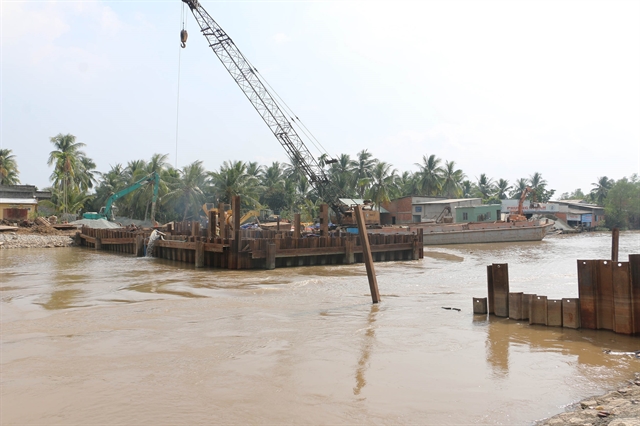 Environment
Environment


|
| A project to prevent salt-water intrusion in Giồng Trôm District in the Mekong Delta province of Bến Tre. — VNA/VNS Photo Công Trí |
Lê Thanh Tùng, deputy head the Department of Plant Cultivation, under the Ministry of Agriculture and Rural Development, speaks to Nông thôn Ngày Nay (Countryside Today) newspaper on the need to develop a long term plan to cope with floods in the Mekong Delta
Do you think the opening of flood gates in the Tiền and Hậu rivers will have negative impacts on agricultural production in the region?
Flood water is only discharged to unproductive land areas lying outside the dyke. This activity is done every three years. So, there is no reason to worry about it.
In recent years, in the face of unpredictable weather and climate change, provinces in the Mekong Delta have adopted actions to adjust agriculture production to make it more adaptable. Based on weather forecasts, local authorities in An Giang and Đồng Tháp Provinces have recommended their farmers not to grow the autumn-winter rice crop.
Provincial authorities in the Mekong Delta have developed specific production plans until 2020 for regions which are subject to flooding.
According to the latest statistics, the Mekong Delta region has successfully changed some 40,000ha of rice to grow other crops. The economic efficiency in regions which have switched from growing rice to other crops has improved.
Many farmers in An Giang and Đồng Tháp Provinces want to give up rice cultivation and switch to other crops. What do you recommend?
Farmers in the Mekong Delta have been growing rice for 50-70 years and rice cultivation is a strong economic sector. They have adapted to climate change and the problem of salt-water intrusion. In addition, the central Government has granted financial support to consolidate the dyke system there to help local farmers adapt to drought and salt water.
In addition, scientists have been successful in developing rice species which are adaptable to high salinity as well as drought.
The Ministry of Agriculture and Rural Development (MARD) has launched a programme to encourage rice farmers in the Mekong Delta to switch to other crops which are more adaptable to climate change.
As weather is unpredictable, does the Department of Plant Cultivation have any recommendations for farmers in the region?
People’s livelihoods in the Mekong Delta should be adaptable to the region’s weather conditions. The MARD has already adopted plans on how to help people living in the region adapt to climate change.
There are four factors that people living in the Mekong Delta should pay attention to – flood frequency; flood duration; timing of the flooding and whether it brings a lot of alluvium.
The quality of the water in the Mekong Delta depends on the frequencies of the floods. Based on the forecast that the flood season in 2019 would be low, the MARD planned a special conference on the winter-autumn rice crop in early October. At that conference the ministry will come up with warnings and recommendations for farmers on how and when to start the winter-autumn rice crop.
Does the MARD have scenarios on how to respond to climate change to help farmers in agriculture production?
Under the Government's Resolution 120 on sustainable development of the Mekong Delta, agriculture production here will be organised according to ecological regions. To implement the Resolution, the MARD will have to review and adjust the region’s development strategy focusing on the three groups of products, including fish, fruit and rice.
According to the plan, areas under rice and other plants requiring a lot of water will be narrowed as commercial profits have dropped. In the meantime, the MARD encourages local farmers to combine agriculture production with eco-tourism. Last but not least, if we want to increase land areas for fruit trees and aquaculture, we must reduce areas under rice cultivation. — VNS




